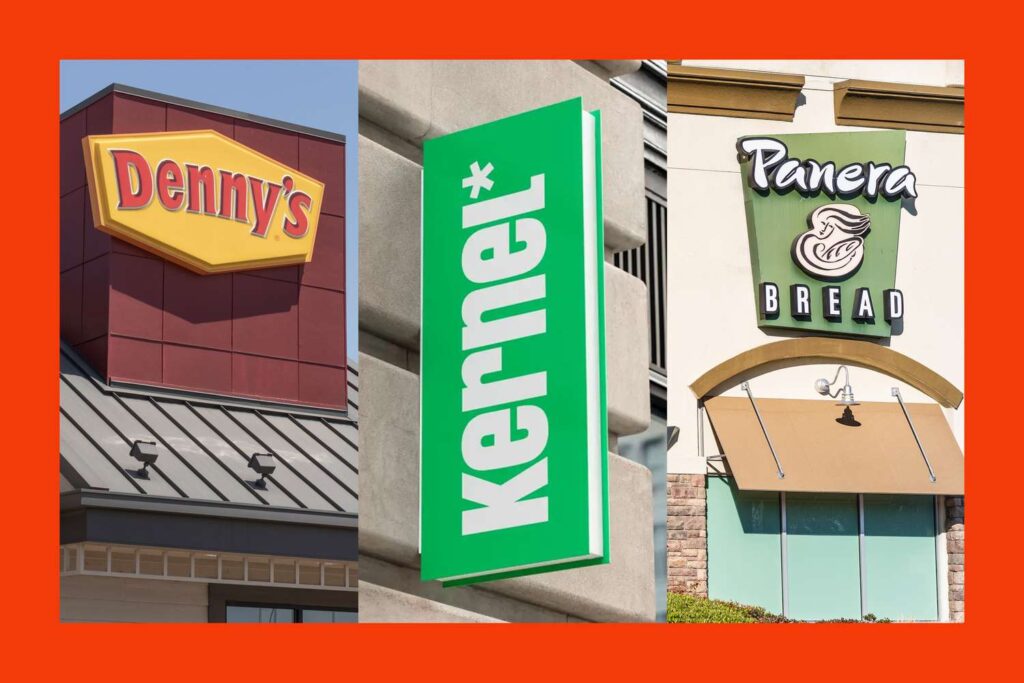You might not think about the global system that connects your combo menu when you walk into a McDonald’s or Denny’s (or order delivery to your home), but it’s a constant consideration for the heads of America’s largest restaurant chains. Industry leaders gathered in Chicago on Wednesday for the WSJ Global Food Forum to discuss where the world of fast food and fast casual is headed.
The forum featured several panels in which WSJ reporters interviewed various industry experts who shared their thoughts on issues of menu development, sustainability, automation and, of course, food pricing.
Rising food costs
Panelists unanimously agreed that rising food prices are an urgent issue. The industry’s highest-profile response to the problem has been McDonald’s $5 Value Menu, which launched June 25. The menu includes a McChicken or McDouble, four pieces of chicken nuggets, fries and a drink, and the company has been encouraged by initial consumer response to the promotion.
“There’s been a lot of excitement and energy around the $5 menu in our restaurants,” McDonald’s USA president Joe Erlinger said of the $5 menu. “This is a way for us to really bring value and affordability to our customers at a time when consumers are really feeling the stress of years of inflation.” (Ehrlinger went on to use the phrase “value and affordability” three more times in this discussion.)
But McDonald’s isn’t the only chain trying to promote affordable food. Denny’s, one of the nation’s largest restaurant chains, is trying to turn consumer inflation fatigue into an opportunity to promote everyday value.
Denny’s All-Day Diner Sale starts at $5.99, highlighting its affordability during tough times when consumers are especially price-sensitive.
Jet City Images/Getty Images
“We call ourselves ‘America’s Diner for Today’s America,'” said Kelly F. Valade, CEO and president of Denny’s. “To us, ‘America today’ means meeting our consumers where they are.”
Valade noted that just as McDonald’s is trying to win back bargain-seeking customers with its new $5 menu items, Denny’s is also touting its affordability by continuing to offer all-day diner deals starting at $5.99. “Denny’s has always been known for value, but we have to continue to evolve and continue to innovate on that front,” Valade said.
automation
As fast food and fast casual chains increasingly turn to robotic kitchen assistants like Flippy 2, the question of how automation will be applied to restaurants in the future is a big one across the industry. Steve Ells, founder and former CEO of Chipotle, explained that automation was a central feature of his vegan fast casual restaurant The Colonel, which opened in Manhattan, and that he hopes to expand it in the future.
“A lot of people [businesses] “We’re trying to dabble in different kinds of automation and robotics that might be useful to us,” Ells said, describing Kernel as “a platform built for technologies that we know are coming.” The menus and all of the tasks that the non-human assistants perform are modularized, allowing the company to “incorporate new technologies into the platform as they become available.”
“And the people who work there will be more customer-facing, more focused on the customer experience, watching dashboards to make sure the systems are working. We’re really reinventing how fast food gets done.”
Ron Shaik, former chairman and CEO of Panera Bread, had a slightly different take on how technology will change the nature of restaurants: Technology by itself isn’t always enough.
Panera Bread aims to focus on the “wholeness” of the diner experience, rather than relying on robotics and automation.
Sandy Photography/Getty Images
“It’s a mistake to think that any customer, any customer, is going to care about automation,” Shaich told the WSJ’s Boudeya Twe. “I think what customers care about is the overall experience they have when they come into a restaurant.” When customers only deal with a machine to place their order, they may find themselves wondering why they came to the restaurant in the first place.
“I would argue that automation that supports employees, humanity and experience is a good thing,” Shaich said. “If I was pitching myself as a technology company or an automation company, I would fail.”
Future-proof
The question of how to continue to feed a growing population (with increasingly pressing financial constraints) has no easy answer, but speakers at the WSJ Global Food Forum pointed to several focus areas for the future, including scale, sustainability and carving out new niches to feed the hungry masses.
For Denny’s, that means a two-pronged approach: continuing to cater to the growing number of breakfast and brunch consumers — the emerging “morning eatery” segment — while maintaining multiple virtual restaurants to accommodate late-night delivery customers. Using Denny’s kitchens to create menu items like Banda Burritos and other digital-only brands allows the company to increase sales at franchise locations using the same employees and equipment.
On the sustainability front, Ells expressed optimism about the expansion of Colonel and other restaurant chains like it.
“Most of us eat fast food, fast casual food, convenience food, but there’s nothing stopping us from making that food really healthy and really delicious,” he said. They need to think about what dishes they can make with ingredients that are available year-round, rather than relying on expensive or exotic ingredients that are out of season. But even just partnering with local instead of national farmers for staples can reduce transportation costs and greenhouse gas emissions.
“Fast doesn’t have to be a typical fast-food experience,” Ells said.


